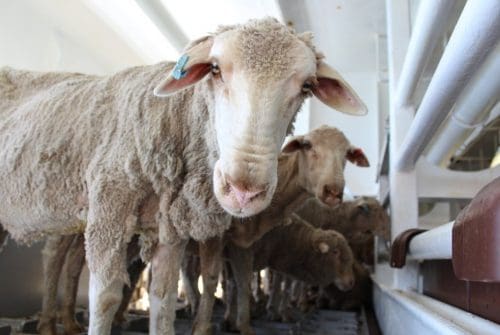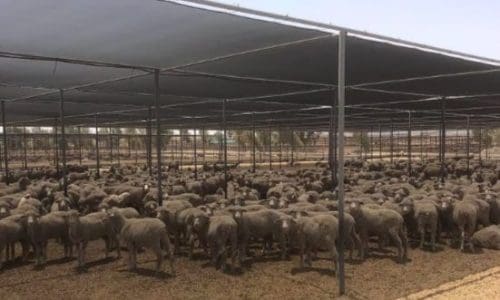
Australian sheep on the KLTT vessel the MV Al Shuwaikh.
AN Australian subsidiary of a major Middle East live sheep exporter has supported efforts to garner market goodwill while criticising the nation’s failure to apologise to customers for moving to phase out exports by sea by 2028.
Australian Livestock Exporters’ Council leaders recently toured key Middle East live sheep export to keep regional relationships strong and highlight growth opportunities.
And Murray Frangs, general manager of RETWA, Australian subsidiary of Kuwait Livestock Transport & Trading Co, said he supported ALEC’s tour as meaningful.
“Yes, certainly it is great to show some positive industry approach to these trading partners who have invested 100s of millions of dollars in the Western Australian agricultural landscape over the years and invested in infrastructure supporting the industry,” he said.
Mr Frangs said it is an embarrassment that there was no offer of support from the Australian Government or even anything that could be construed as an apology for the wasted investment over the recent years, other than to buy boxed red meat, “which KLTT is doing in substantial quantities anyway.”
Mr Frangs said the Australian government has offered no support what so ever to the trading partners in this significant industry or to the exporter entities operating out of Australia. KLTT has been one of the biggest buyers of Australian sheep for live export.
“A key point to remember here is that in 2018 after there was a significant incident in the transport sector for live export the government of the day went to Kuwait in order to appease them and provide confidence that they continue to build their $200 million processing facility and state of the art livestock carrier vessels that were specifically designed around intake of Australian merino sheep.
“The devastation that this move to shut the industry does to an organisation that has specifically built a state of the art processing facility with the intended purpose of processing Australian sheep is immense,” he said.
“Unfortunately there is no legal recourse and evidently the ethical or moral standpoint of having enticed the investment doesn’t weight into the current government’s consideration,” Mr Frangs said.

Australian sheep in a Kuwait feedlot.
Episode 3’s report ‘Phasing Out Live Sheep Exports from Australia’ last years said KLTT recently built a new, modern slaughterhouse, compliant with the Australian Government’s Exporter Supply Chain Assurance System requirements and purchased a new livestock carrier to enable them to meet requirements under Australian Standards for the Export of Livestock and Australian maritime regulations. These investments were valued at about US$100m. Rural Export and Trading Pty Ltd (RETWA), an Australian-based subsidiary of KLTT, invested heavily in a registered premises to hold sheep prior to departure, an office building and a feed mill. From 2018 to 2022 RETWA also spent around $650,000 (co-funded with Meat & Livestock Australia) on projects in the Middle East to improve animal welfare and facility operations. Livestock Shipping Services built up a fleet of five livestock transport vessels approved by the Australian Maritime Safety Authority and developed an in-market consulting and development team devoted to improving livestock handling, animal welfare, food safety and meat hygiene in the markets of their customers, the report said.
Untapped MENA capacity for boxed meat is a fallacy
Mr Frangs said KLTT imports a significant amount of chilled red from Australia, that the MENA region demands and consumes every year.
“This fallacy that trade representations have been making to the consumers recently in the MENA region that there is an untapped capacity of chilled boxed red meat to come from Australia is so out of touch.
“Processing capacity, pricing and logistics all result in the level that is currently imported from Australia vs other countries,” he said.
“Nothing significant has changed to warrant a different outcome at this point.”
Other countries will be unable to replace Australian supply
Mr Frangs said KLTT had increased its investment in South Africa as an alternative sheep source after Australia in 2019 instituted a northern summer moratorium period on Middle East shipments — from June – September. To sustain the constant demand in destination markets there has to be some way to source supply, he said.
“These countries are not set up like Australia, don’t have the agricultural systems, suitable infrastructure, and accumulation protocols like Australia has so it will be a long time before this could even be contemplated as a regular or a significant source of livestock.
“All the sheep available from these smaller markets still leave the entire industry well below the mark in terms of trying to satisfy the required demand.”
Mr Frangs said KLTT is well committed to the industry and will operate to the full extent allowed and for the full period that shipments are approved before the trade phaseout date of 1 May 2028.
“Those opposed to the industry are all gleeful that their association with a government desperate for votes has lead to this outcome, but the irony is that they have now subjected millions of sheep and cattle to exporting conditions far lower than would ever be allowed from Australia.
“Australia’s presence in the live export industry massively improves the overall welfare standards that exist around the world,” he said.
“Australia’s live export system has been continually refining the processes and protocols over many years of dedicated and passionate practise and advocacy.”

HAVE YOUR SAY